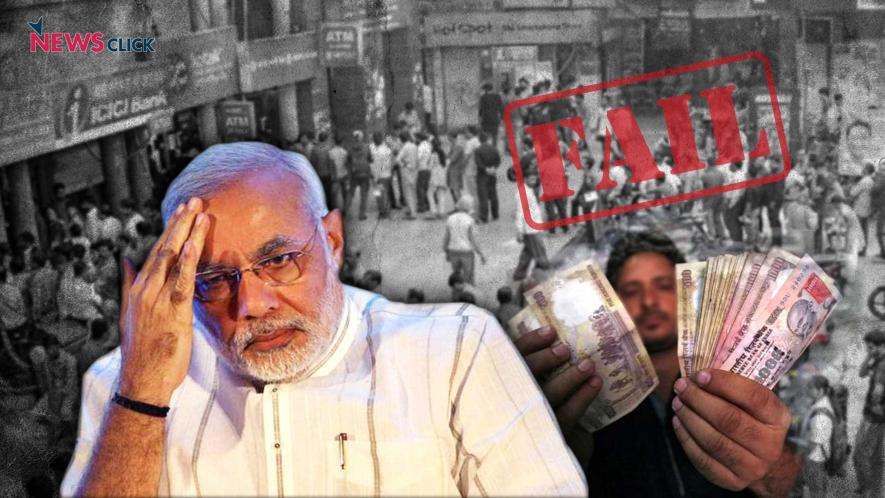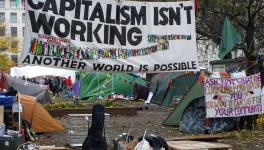Economic Crisis: Why it Suits Neoliberals to Point Fingers Solely on Demonetisation ‘Shock’

With former prime minister Manmohan Singh resurfacing on the political landscape and articulating once more the orthodox neoliberal position, one can now clearly discern three distinct perspectives on the current economic slowdown.
The first is the orthodox neoliberal position that Singh has now articulated. This states that the crisis is a consequence not of the neoliberal policies that the country has been following since 1991, but of completely extraneous factors, such as demonetisation and the “hasty manner of introducing the Goods and Services Tax”, for which the Narendra Modi administration is squarely responsible. Singh called the crisis “man-made”, i.e, a result of human error, arising from a lack of judgement and understanding, because of which such extraneous jolts to the system were administered, rather than of any immanent tendency within the neoliberal trajectory itself.
The conclusion that would follow from this perspective for overcoming the crisis is to keep pursuing the neoliberal trajectory, but to refrain from administering such shocks to the system, by making a habit of consulting “thinking people” on economic matters.
This position does not specifically adduce any deficiency of aggregate demand as underlying the crisis, and hence does not see any specific need to inject demand into the system, not even by way of the sort of basic income scheme that the Congress party itself had come up with on the eve of the 2019 Lok Sabha elections. The Nyaya Scheme, as it was called, had visualised giving Rs 6,000 per month to each household within the bottom quintile, which would come to about five crore households. Of course, how the scheme was to be financed, how the beneficiaries were to be identified, how inter se equity among the poor was to be ensured, were all left unclear. The scheme was more an expression of intent than a worked out proposal.
Being faithful to the Congress manifesto would have required an effort to link the launching of that scheme to the economic crisis the country is currently facing. But Manmohan Singh made no such effort. In that sense, his analysis and perspective, and indeed that of the neoliberal advocates in general, mark a departure from what Rahul Gandhi himself was saying as recently as March this year. (It is noteworthy that Manmohan Singh had said nothing at the time about the Nyaya Scheme of the Congress, and former finance minister P Chidambaram had only said that it was a feasible scheme. The advocates of neoliberalism, it would not be wrong to infer, were less than enthusiastic about that scheme).
The second position on the crisis, that of the government, sees neither neoliberalism, nor demonetisation and the “hasty manner of introduction of the GST (goods and services tax)”, as the cause of the downturn; in fact, it sees no downturn at all. True, finance minister Nirmala Sitharaman, has announced a slew of concessions to the capitalists, involving retractions of her budgetary proposals; and the Reserve Bank of India (RBI) has brought down the interest rate, apart from giving the government Rs 1.76 lakh crore to spend from its own reserves. But these measures have not been accompanied by any admission on the part of the government of a downturn in the economy.
Besides, these measures will do little to arrest that downturn. While a reduction in the interest rate, or more generally greater ease of credit, has little effect on private investment, which is largely interest-unresponsive in a downturn, the sum of Rs 1.76 lakh crore handed over by the RBI will just about make up for the anticipated shortfall in revenue collections compared with the budget estimates; since the budget itself was not an expansionary one, such offsetting of revenue shortfall will hardly help in overcoming the crisis. The government, in short, has done little to counter the downturn in the economy and has not even admitted to its existence. This second position, therefore, is a position of denial, or at best of confusion.
Against these two positions, there is the third position, that of the Left, which not only recognises the crisis and its severity, but also locates its roots squarely within the neoliberal trajectory. A neoliberal regime necessarily imposes a squeeze on peasant agriculture, which both reduces peasant incomes, forcing many to migrate to cities in search of non-existent jobs, thereby swelling the reserve army of labour, and also brings down the growth of agricultural production, including food production. This swelling of the reserve army of labour has a restraining effect on the incomes of the entire body of working people, even as labour productivity keeps going up, increasing the share of surplus in output and exacerbating income and wealth inequalities.
For both these reasons, namely, the fall in agricultural growth rate, and increase in income inequality, the market for a whole range of goods remains constrained. This may be offset for a while by specific factors like pent-up demand from earlier times or the wealth effect arising from asset-price bubbles, but eventually it expresses itself in the form of an over-production crisis.
This is what is happening in India; and since similar tendencies have been at work all over the world, the crisis of over-production has a world-wide impact, which makes any effort on the part of India to escape its consequences, such as by stepping up exports, a futile one. What we are witnessing, therefore, is a dead-end to which neoliberalism has brought the world.
The Modi government’s measures, such as demonetisation and GST, have aggravated the crisis for India; but to say that these measures alone are behind the crisis in India, flies in the face of facts. It is noteworthy that Manmohan Singh and others of neoliberal persuasion do not explain why demonetisation should bring the growth rate down, when the bulk of the disabled currency has already been exchanged for new currency long ago. True, demonetisation has had a lasting impact on the petty production sector; but that, while being a contributory factor, cannot explain the severity of the downward lurch of the economy, when sectors from automobiles to even biscuits, are suddenly facing serious demand deficiency. Likewise, it would not explain why the crisis of over-production is not just confined to India but represents a world-wide phenomenon.
The solution to the crisis which follows is equally clear, namely putting more purchasing power in the hands of the working people by providing them inter alia with free healthcare, free education, guaranteed employment, cheap food and non-contributory old-age pensions.
While putting additional purchasing power into people’s hands would lead to better capacity utilisation in the industrial sector and thereby cause larger investment, to ensure that it does not cause inflation in food prices, there has to be an increase in food production. This requires the State’s extending support to peasant agriculture, through ensuring remunerative prices, through enacting land reform measures at the expense of the landed interests and of those who have been carrying out primitive accumulation of capital, and through making subsidised inputs available. In fact, several studies have been carried out which give a clear idea of how exactly the financial resources needed for this alternative agenda can be met.
Above all, however, the Left agenda requires mobilising the working people to bring about a change in the correlation of class forces, away from that which characterises the neoliberal regime. It is not a socialist agenda, but one that would entail the imposition of greater taxes on the capitalists, especially in the form of wealth taxation; otherwise, if common people are taxed instead, to finance larger government spending, then there will be hardly any net expansion of aggregate demand, and hardly any alleviation of the crisis.
It is significant that advocates of neoliberalism, such as Manmohan Singh, do not have any concrete suggestions on how the crisis can be overcome (other than the general pursuit of neoliberalism). They advise the government to consult “thinking people”, suggesting implicitly that the government itself lacks thinking, a point one can scarcely disagree with; but on what exactly these “thinking people” from the neoliberal camp will advise the government, there is silence. This is hardly surprising: the dead-end of neoliberalism means that its “thinking people” too have run out of ideas.
Get the latest reports & analysis with people's perspective on Protests, movements & deep analytical videos, discussions of the current affairs in your Telegram app. Subscribe to NewsClick's Telegram channel & get Real-Time updates on stories, as they get published on our website.
























